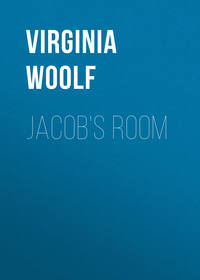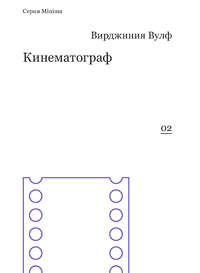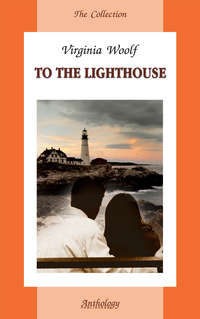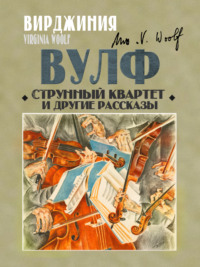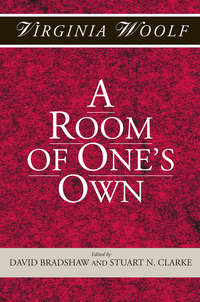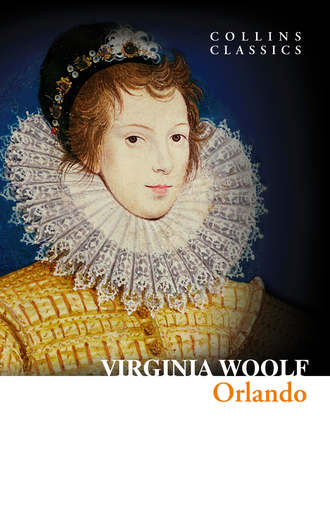
Полная версия
Orlando

ORLANDO
Virginia Woolf

History of Collins
In 1819, millworker William Collins from Glasgow, Scotland, set up a company for printing and publishing pamphlets, sermons, hymn books, and prayer books. That company was Collins and was to mark the birth of HarperCollins Publishers as we know it today. The long tradition of Collins dictionary publishing can be traced back to the first dictionary William published in 1824, Greek and English Lexicon. Indeed, from 1840 onwards, he began to produce illustrated dictionaries and even obtained a licence to print and publish the Bible.
Soon after, William published the first Collins novel, Ready Reckoner; however, it was the time of the Long Depression, where harvests were poor, prices were high, potato crops had failed, and violence was erupting in Europe. As a result, many factories across the country were forced to close down and William chose to retire in 1846, partly due to the hardships he was facing.
Aged 30, William’s son, William II, took over the business. A keen humanitarian with a warm heart and a generous spirit, William II was truly “Victorian” in his outlook. He introduced new, up-to-date steam presses and published affordable editions of Shakespeare’s works and The Pilgrim’s Progress, making them available to the masses for the first time. A new demand for educational books meant that success came with the publication of travel books, scientific books, encyclopedias, and dictionaries. This demand to be educated led to the later publication of atlases, and Collins also held the monopoly on scripture writing at the time.
In the 1860s Collins began to expand and diversify and the idea of “books for the millions” was developed. Affordable editions of classical literature were published, and in 1903 Collins introduced 10 titles in their Collins Handy Illustrated Pocket Novels. These proved so popular that a few years later this had increased to an output of 50 volumes, selling nearly half a million in their year of publication. In the same year, The Everyman’s Library was also instituted, with the idea of publishing an affordable library of the most important classical works, biographies, religious and philosophical treatments, plays, poems, travel, and adventure. This series eclipsed all competition at the time, and the introduction of paperback books in the 1950s helped to open that market and marked a high point in the industry.
HarperCollins is and has always been a champion of the classics, and the current Collins Classics series follows in this tradition – publishing classical literature that is affordable and available to all. Beautifully packaged, highly collectible, and intended to be reread and enjoyed at every opportunity.
Life & Times
Mental Health and Creativity
It would be fair to say that Virginia Woolf was an intense and complex personality. Some might describe her as highly imaginative, sensitive and creative, while others might use the words high-maintenance, introspective and obsessive. In truth, she was all of the above, which meant that she was highly regarded as a novelist by many and entirely disregarded by others.
The central sticking point with the latter was that she came from a highly privileged, upper-middle-class background, yet she viewed the world in quite a negative light. Untroubled by the daily pressures of most, her time was spent in deep analysis of life – or rather, her own life and that of her friends and family. Her literature, therefore, could occasionally disconnect with the lay reader, because her concerns could be seen as self-indulgent and focused on a rarified environment to which most people were not privy.
As a human specimen, Woolf was not a very robust figure. She was prone to bouts of depression and breakdown, in part possibly brought on by the lack of any necessity to just get on with activities that were positive for her mental and physical constitution. In the absence of responsibilities to toughen the character, she lived in a world of ever-decreasing circles until, one day, her horizons closed in so tight that she chose suicide as a means of escape. She filled the pockets of her overcoat with pebbles and walked headlong into a river to drown her sorrows, quite literally. Her life was ended by her own thoughts and actions at the age of 59.
Woolf is a classic case of an artist whose creative expression was bad for their health. Had she abandoned writing in favour of an occupation that took her mind away from her obsessive thoughts, she would undoubtedly have lived a happier and more fulfilled life, but instead she became the author of her own undoing. So, a weighty question remains: was it worth all the pain and suffering? Inevitably those with similar leanings will say yes, because they are able to identify with Woolf’s desire to commit her thoughts to the written word as a kind of catharsis. Inevitably those who cannot identify will say no, because her work offers nothing to which they can relate as they have no need of therapy. It may be that there has never been a more divisive novelist in the history of English literature, and this is probably Woolf’s most interesting aspect.
Woolf’s main influence on modern literature was her ‘stream of consciousness’ approach to prose. Her novels were really vehicles for the copious current of thoughts and emotions to flow without parameters. She was an aesthete and intelligentsium, investing all of her mental capacity into understanding and disseminating the minutiae of human nature, human society, human culture and the human condition. Woolf and her set could be seen as looking down on those who chose not to analyse human existence in such microscopic detail, but realistically this was probably the result of insecurities about one’s own talent, context and significance. The one thing that is certain about belief systems is that believing things doesn’t make them true. This is certainly not to say that Woolf’s portfolio has no value – far from it – but that we do well to remember the context of the author. After all, it was precisely because she existed in her particular milieu that she produced her pioneering style of literature. Moreover, had she been born into a more typical, lower-middle or working class background, she would probably not have had the wherewithal to dissect humanity to such a level.
Orlando
Virginia Woolf’s novel Orlando, published in 1928, is one of the most curious creations of English literature. In essence it is an exploration of the role and perception of gender throughout history, from the Elizabethan period through to the early twentieth century.
At the start of the novel Orlando – the eponymous hero based on Woolf’s female lover, Vita Sackville-West – is a young, effeminate man at the court of Elizabeth I. During the course of the novel he metamorphoses into a woman, and, to further confuse and blur the traditional boundaries between male and female, indulges in transgender dressing. This enables Woolf to consider the various ways in which the character is treated by others, both as a man and a woman.
Since the character of Orlando is immortal, the story spans different centuries which allows Woolf to explore society’s responses to gender and sexual orientation. The novel’s themes and its treatment of them meant that Orlando was considered a work of modernist literature on publication, dealing with issues that were taboo in British society at the time. Due to its bold use of unconventional literary devices, many would argue that Woolf turned the novel into a form that disregarded established literary protocol for the sake of artistic and intellectual experimentation.
Despite its daring and innovation, Orlando is also an accessible and entertaining read. Woolf was not so blinded by her curiosity in exploring her subject matter and literary style that she forgot that she was writing for an audience. Orlando was, and still is, considered to be a genre-defying work, pushing the boundaries as it does between pioneering and storytelling.
The Bloomsbury Set
Virginia Woolf came from a background of intellectualism, however, this was largely cemented by her family’s relocation from Kensington to Bloomsbury, where she became part of an intellectual elite known as the Bloomsbury Set. Together, they were all goldfish in the same bowl, looking out at the world around them with a similar artistic palette.
The pretentions of her social group actually allowed her to blossom as a writer, because she was given the encouragement and freedom she needed to experiment with her prose. In short, she was allowed to think of herself as an author and she was told what she wanted to hear. This was vitally important to someone with nagging self-doubt, so she developed deep and lasting bonds with those who saw and nurtured her potential. Indeed, she married one of them – Leonard Woolf – and remained devoted to him.
In time, of course, the pretentions of the Bloomsbury Set transcended into success, as they were undoubtedly intelligent, talented and well educated. This process of ascendance was, in part, aided by a number of stunts designed to draw public attention. One stunt in particular has become famous for its daring and humour: the Dreadnought Hoax. This was an elaborate plan to gain egress to the battleship HMS Dreadnought for no other reason than to have a good look around. A number of the Bloomsbury Set, including Woolf, disguised themselves as Abyssinian princes. They wore the appropriate garb of robes and turbans, but they also ‘blacked-up’ and sported fake beards. With escort and interpreter in tow, they boarded a VIP coach and took a train from Paddington to Weymouth, where they were received as genuine royalty with honour guard and allowed to inspect Royal Navy fleet. All the while, they pretended to communicate in a foreign tongue by uttering gibberish furnished with Greek and Latin, which the interpreter duly pretended to understand and translate.
Having returned to London, a photograph of the Bloomsbury Set, still in character, was sent to the Daily Mirror newspaper and the hoax was revealed. Not surprisingly, the affair turned into a scandal. The Foreign Office and the Royal Navy were the target of a great deal of finger-pointing, partly in fun and partly in seriousness for allowing such a blatant lapse in national security. The situation wasn’t helped by the fact that the Bloomsbury Set were pacifists, which only served to rub salt into the wound. When the Navy high command pushed to have the perpetrators punished, they found themselves powerless to do anything. For one thing, no laws were broken, and secondly the consensus was that they themselves should be punished for allowing themselves to be beguiled by such a lame practical joke.
Needless to say, the Dreadnought Hoax planted the Bloomsbury Set in the public consciousness once and for all, as the oxygen of publicity was theirs to breathe in and enjoy. The hoax occurred on 7 February, 1910. Woolf’s first novel was begun the same year, although she did not publish until 1915, by which time she was already a minor celebrity.
Despite her subsequent success, Woolf was never particularly contented, however, for she had such a troubled soul and indefatigable mind. Today her malady would, doubtless, be described as a bipolar condition, for she oscillated from exuberant mood highs to despairing clinical lows. In the end, she was convinced that she would never come full circle again, so she decided to cut her loses while in the grip of a crushing depression that rendered her unable to see any light at the end of the tunnel. Virginia Woolf died in 1941, leaving behind a highly respected, progressive and considerable canon of essays, critique and novels.
Dedication
To Vita Sackville-West
Contents
Cover
Title Page
History of Collins
Life & Times
Dedication
Chapter 1
Chapter 2
Chapter 3
Chapter 4
Chapter 5
Chapter 6
Classic Literature: Words and Phrases
Footnotes
Copyright
About the Publisher
CHAPTER 1
He–for there could be no doubt of his sex, though the fashion of the time did something to disguise it–was in the act of slicing at the head of a Moor which swung from the rafters. It was the colour of an old football, and more or less the shape of one, save for the sunken cheeks and a strand or two of coarse, dry hair, like the hair on a cocoanut. Orlando’s father, or perhaps his grandfather, had struck it from the shoulders of a vast Pagan who had started up under the moon in the barbarian fields of Africa; and now it swung, gently, perpetually, in the breeze which never ceased blowing through the attic rooms of the gigantic house of the lord who had slain him.
Orlando’s fathers had ridden in fields of asphodel, and stony fields, and fields watered by strange rivers, and they had struck many heads of many colours off many shoulders, and brought them back to hang from the rafters. So too would Orlando, he vowed. But since he was sixteen only, and too young to ride with them in Africa or France, he would steal away from his mother and the peacocks in the garden and go to his attic room and there lunge and plunge and slice the air with his blade. Sometimes he cut the cord so that the skull bumped on the floor and he had to string it up again, fastening it with some chivalry almost out of reach so that his enemy grinned at him through shrunk, black lips triumphantly. The skull swung to and fro, for the house, at the top of which he lived, was so vast that there seemed trapped in it the wind itself, blowing this way, blowing that way, winter and summer. The green arras with the hunters on it moved perpetually. His fathers had been noble since they had been at all. They came out of the northern mists wearing coronets on their heads. Were not the bars of darkness in the room, and the yellow pools which chequered the floor, made by the sun falling through the stained glass of a vast coat of arms in the window? Orlando stood now in the midst of the yellow body of an heraldic leopard. When he put his hand on the window sill to push the window open, it was instantly coloured red, blue, and yellow like a butterfly’s wing. Thus, those who like symbols, and have a turn for the deciphering of them, might observe that though the shapely legs, the handsome body, and the well-set shoulders were all of them decorated with various tints of heraldic light, Orlando’s face, as he threw the window open, was lit solely by the sun itself. A more candid, sullen face it would be impossible to find. Happy the mother who bears, happier still the biographer who records the life of such a one! Never need she vex herself, nor he invoke the help of novelist or poet. From deed to deed, from glory to glory, from office to office he must go, his scribe following after, till they reach whatever seat it may be that is the height of their desire. Orlando, to look at, was cut out precisely for some such career. The red of the cheeks was covered with peach down; the down on the lips was only a little thicker than the down on the cheeks. The lips themselves were short and slightly drawn back over teeth of an exquisite and almond whiteness. Nothing disturbed the arrowy nose in its short, tense flight; the hair was dark, the ears small, and fitted closely to the head. But, alas, that these catalogues of youthful beauty cannot end without mentioning forehead and eyes. Alas, that people are seldom born devoid of all three; for directly we glance at Orlando standing by the window, we must admit that he had eyes like drenched violets, so large that the water seemed to have brimmed in them and widened them; and a brow like the swelling of a marble dome pressed between the two blank medallions which were his temples. Directly we glance at eyes and forehead, thus do we rhapsodize. Directly we glance at eyes and forehead, we have to admit a thousand disagreeables which it is the aim of every good biographer to ignore. Sights disturbed him, like that of his mother, a very beautiful lady in green walking out to feed the peacocks with Twitchett, her maid, behind her; sights exalted him–the birds and the trees; and made him in love with death–the evening sky, the homing rooks; and so, mounting up the spiral stairway into his brain–which was a roomy one–all these sights, and the garden sounds too, the hammer beating, the wood chopping, began that riot and confusion of the passions and emotions which every good biographer detests. But to continue–Orlando slowly drew in his head, sat down at the table, and, with the half-conscious air of one doing what they do every day of their lives at this hour, took out a writing book labelled Aethelbert: A Tragedy in Five Acts, and dipped an old stained goose quill in the ink.
Soon he had covered ten pages and more with poetry. He was fluent, evidently, but he was abstract. Vice, Crime, Misery were the personages of his drama; there were Kings and Queens of impossible territories; horrid plots confounded them; noble sentiments suffused them; there was never a word said as he himself would have said it, but all was turned with a fluency and sweetness which, considering his age–he was not yet seventeen–and that the sixteenth century had still some years of its course to run, were remarkable enough. At last, however, he came to a halt. He was describing, as all young poets are forever describing, nature, and in order to match the shade of green precisely he looked (and here he showed more audacity than most) at the thing itself, which happened to be a laurel bush growing beneath the window. After that, of course, he could write no more. Green in nature is one thing, green in literature another. Nature and letters seem to have a natural antipathy; bring them together and they tear each other to pieces. The shade of green Orlando now saw spoilt his rhyme and split his metre. Moreover, nature has tricks of her own. Once look out of a window at bees among flowers, at a yawning dog, at the sun setting, once think “how many more suns shall I see set,” etc. etc. (the thought is too well known to be worth writing out) and one drops the pen, takes one’s cloak, strides out of the room, and catches one’s foot on a painted chest as one does so. For Orlando was a trifle clumsy.
He was careful to avoid meeting anyone. There was Stubbs, the gardener, coming along the path. He hid behind a tree till he had passed. He let himself out at a little gate in the garden wall. He skirted all stables, kennels, breweries, carpenters’ shops, washhouses, places where they make tallow candles, kill oxen, forge horseshoes, stitch jerkins–for the house was a town ringing with men at work at their various crafts–and gained the ferny path leading uphill through the park unseen. There is perhaps a kinship among qualities; one draws another along with it; and the biographer should here call attention to the fact that this clumsiness is often mated with a love of solitude. Having stumbled over a chest, Orlando naturally loved solitary places, vast views, and to feel himself for ever and ever and ever alone.
So, after a long silence, “I am alone,” he breathed at last, opening his lips for the first time in this record. He had walked very quickly uphill through ferns and hawthorn bushes, startling deer and wild birds, to a place crowned by a single oak tree. It was very high, so high indeed that nineteen English counties could be seen beneath; and on clear days thirty or perhaps forty, if the weather was very fine. Sometimes one could see the English Channel, wave reiterating upon wave. Rivers could be seen and pleasure boats gliding on them; and galleons setting out to sea; and armadas with puffs of smoke from which came the dull thud of cannon firing; and forts on the coast; and castles among the meadows; and here a watch tower; and there a fortress; and again some vast mansion like that of Orlando’s father, massed like a town in the valley circled by walls. To the east there were the spires of London and the smoke of the city; and perhaps on the very sky line, when the wind was in the right quarter, the craggy top and serrated edges of Snowdon herself showed mountainous among the clouds. For a moment Orlando stood counting, gazing, recognizing. That was his father’s house; that his uncle’s. His aunt owned those three great turrets among the trees there. The heath was theirs and the forest; the pheasant and the deer, the fox, the badger, and the butterfly.
He sighed profoundly, and flung himself–there was a passion in his movements which deserves the word–on the earth at the foot of the oak tree. He loved, beneath all this summer transiency, to feel the earth’s spine beneath him; for such he took the hard root of the oak tree to be; or, for image followed image, it was the back of a great horse that he was riding, or the deck of a tumbling ship–it was anything indeed, so long as it was hard, for he felt the need of something which he could attach his floating heart to; the heart that tugged at his side; the heart that seemed filled with spiced and amorous gales every evening about this time when he walked out. To the oak tree he tied it and as he lay there, gradually the flutter in and about him stilled itself; the little leaves hung, the deer stopped; the pale summer clouds stayed; his limbs grew heavy on the ground; and he lay so still that by degrees the deer stepped nearer and the rooks wheeled round him and the swallows dipped and circled and the dragonflies shot past, as if all the fertility and amorous activity of a summer’s evening were woven web-like about his body.
After an hour or so–the sun was rapidly sinking, the white clouds had turned red, the hills were violet, the woods purple, the valleys black–a trumpet sounded. Orlando leapt to his feet. The shrill sound came from the valley. It came from a dark spot down there; a spot compact and mapped out; a maze; a town, yet girt about with walls; it came from the heart of his own great house in the valley, which, dark before, even as he looked and the single trumpet duplicated and reduplicated itself with other shriller sounds, lost its darkness and became pierced with lights. Some were small hurrying lights, as if servants dashed along corridors to answer summonses; others were high and lustrous lights, as if they burnt in empty banqueting halls made ready to receive guests who had not come; and others dipped and waved and sank and rose, as if held in the hands of troops of serving men, bending, kneeling, rising, receiving, guarding, and escorting with all dignity indoors a great Princess alighting from her chariot. Coaches turned and wheeled in the courtyard. Horses tossed their plumes. The Queen had come.
Orlando looked no more. He dashed downhill. He let himself in at a wicket gate. He tore up the winding staircase. He reached his room. He tossed his stockings to one side of the room, his jerkin to the other. He dipped his head. He scoured his hands. He pared his finger nails. With no more than six inches of looking glass and a pair of old candles to help him, he had thrust on crimson breeches, lace collar, waistcoat of taffeta, and shoes with rosettes on them as big as double dahlias in less than ten minutes by the stable clock. He was ready. He was flushed. He was excited. But he was terribly late.
By short cuts known to him, he made his way now through the vast congeries of rooms and staircases to the banqueting hall, five acres distant on the other side of the house. But halfway there, in the back quarters where the servants lived, he stopped. The door of Mrs. Stewkley’s sitting room stood open–she was gone, doubtless, with all her keys to wait upon her mistress. But there, sitting at the servant’s dinner table with a tankard beside him and paper in front of him, sat a rather fat, shabby man, whose ruff was a thought dirty, and whose clothes were of hodden brown. He held a pen in his hand, but he was not writing. He seemed in the act of rolling some thought up and down, to and fro in his mind till it gathered shape or momentum to his liking. His eyes, globed and clouded like some green stone of curious texture, were fixed. He did not see Orlando. For all his hurry, Orlando stopped dead. Was this a poet? Was he writing poetry? “Tell me,” he wanted to say, “everything in the whole world”–for he had the wildest, most absurd, extravagant ideas about poets and poetry–but how speak to a man who does not see you? who sees ogres, satyrs, perhaps the depths of the sea instead? So Orlando stood gazing while the man turned his pen in his fingers, this way and that way; and gazed and mused; and then, very quickly, wrote half-a-dozen lines and looked up. Whereupon Orlando, overcome with shyness, darted off and reached the banqueting hall only just in time to sink upon his knees and, hanging his head in confusion, to offer a bowl of rose water to the great Queen herself.


